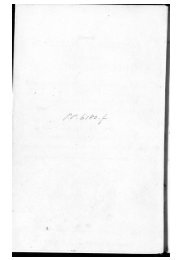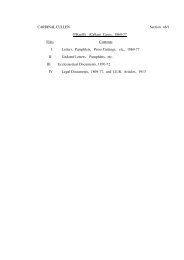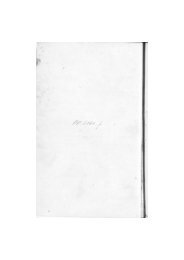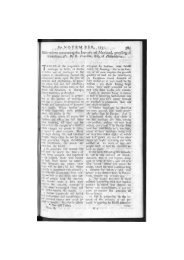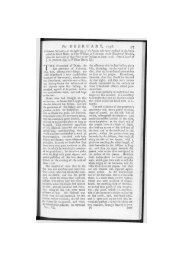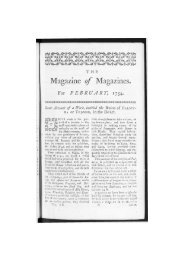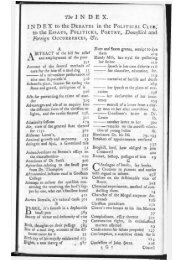Magazine of Magazines
Magazine of Magazines
Magazine of Magazines
Create successful ePaper yourself
Turn your PDF publications into a flip-book with our unique Google optimized e-Paper software.
4 ^ M A G A Z I N E<br />
<strong>of</strong> this sacrament ; and then it will be<br />
necessary, for ought 1 can See, to receive<br />
it in the very gesture ufed by our<br />
^saviour, aSter Supper, in an upper<br />
room, not above the number o f twelve<br />
besides him that administers, and only<br />
men, and not women. For if the bare<br />
example <strong>of</strong> our Saviour makes it necessary<br />
for us to do the like, then every<br />
circumstance observed by him, will<br />
become necessary to us. But this, I<br />
think, is nobody's opinion, and therefore<br />
our Saviour's bare example is as<br />
no force in this matter. Or else the<br />
reaSon must be, becauSe the gesture used<br />
by our Saviour, is in its own nature So<br />
proper and Suitable to the sacrament, as<br />
may Seem to make it necessary ; and<br />
this is that, which I think you insist upr<br />
on. But we must take heed as concluding,<br />
that God hath commanded<br />
or forbidden a thing, because we think<br />
it very Suitable, or unsuitable. By this<br />
argument indeed the papists endeavour<br />
to prove an inlallible judge oS controversies,<br />
and a great many other things ;<br />
lout 'tis a very Slippery and uncertain<br />
ar-^umcnt. And to make the whole<br />
action <strong>of</strong> the Sacrament, with all the<br />
circumstances <strong>of</strong> it, to be obligatory<br />
to us, not only the administration as<br />
the sacrament in the elements <strong>of</strong> bread<br />
and wine, must be expressly commanded,<br />
but every circumstance likewise<br />
must be expressly enjoined. Otherwise<br />
the argument from an imaginable suitableness<br />
will be <strong>of</strong> no manner <strong>of</strong> force;<br />
for many things may befuitable enough,<br />
which are by no mean^ necessary. Besides,<br />
that I cannot see but that this<br />
way <strong>of</strong> arguing is rather as greater<br />
force as to the receiving it after Supper,<br />
since this is expressly mentioned by St.<br />
Paul, i (.'or, xi, where he pr<strong>of</strong>effeth to<br />
deelare the institution just as he received<br />
it, but says not a word <strong>of</strong> the gesture.<br />
And in AaSs xx. we find, that<br />
the disciples met together in the evening<br />
to break bread, and in an upper<br />
chamber ; So that it Seems they did observe<br />
the circumstances both as time<br />
and place, in which our Saviour celebrated<br />
it. And the circumstance <strong>of</strong><br />
time was so constantly obferved by the<br />
apostles, as to give this Sacrament the<br />
name <strong>of</strong> the Lord's Supper ( i Cor. ri.<br />
2o. ) which hath ever Since continued<br />
in the Christian church, the' the time<br />
hath been altered from evening to<br />
morning. And now if suitableness be<br />
such an argument , it seems to me every<br />
whit as unsuitable to celebrate a Supper<br />
in the morning, as to communicate<br />
at a feast at any other than the common<br />
table gesture.<br />
But then the consequence <strong>of</strong> the<br />
thing is much worse, because you mult<br />
either during this erroneous persuafioa<br />
(as l think) osyour mind, nut receive<br />
the Sacrament at all, which is to neglect<br />
a great and plain 'institution <strong>of</strong><br />
the Christian religion ; or you mult<br />
break the peace, and feperate from the<br />
communion <strong>of</strong> the church, upon fuck<br />
a reason, as will prnduce seperatioa<br />
without end : for if every little doubt<br />
and s c r u p l e be ground fusficierrt to warrant<br />
a seperation, the peace and unity<br />
<strong>of</strong> the church will be perpetually in<br />
danger. I have been credibly informed,<br />
that in the late times there was an anabaptist<br />
church in London, that in a Short<br />
Space Subdivided into thirty Several<br />
churches, upon different opinions, about<br />
the circumstances oS administring<br />
the two sacraments; and every party<br />
so stissty insisted upon that circumftance,<br />
which they thought neceffary, that<br />
they could not in conscience communicate<br />
with one another.<br />
And now, Madam, upon the whole<br />
matter, l beseech you Seriously to consider<br />
theSe Sew things : 1st, That one<br />
may Sin greatly in Sallowing she persuasion<br />
<strong>of</strong> an erring conscience. adly ,<br />
That it is only in things wherein v.e<br />
are perfectly at liberty, that a doubting<br />
conscience binds us Srom acting<br />
contrary to is ; which is the cafe St.<br />
Paul was fpeaking <strong>of</strong> in the text yen<br />
cite; be thai donbleih, is damned if he<br />
eat. But where there is an obligation<br />
to the thing (for instance, the command<br />
<strong>of</strong> lawful authority) this ought to ove^*<br />
rule the doubt, whether the thit^<br />
commanded he lawful, but l must he<br />
cleats







